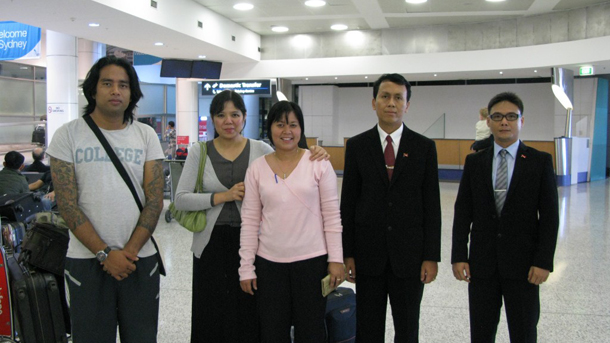SYDNEY, Australia — “When I arrived at the University of Sydney, my heart ached for the students of Burma,” said National League for Democracy (NLD) MP Sandar Min during a recent visit to Australia to attend a five-day workshop.
“I feel very sad every time I visit a democratic country because I can see with my own eyes how far behind our country has fallen,” she said, adding that her acute sense of Burma’s disadvantaged position on the world stage was one of the main reasons she has continued her political activities despite many obstacles.
The overseas trip—the first that the NLD has sent any of its members on since it re-registered late last year—was actually Sandar Min’s second to Australia. In 2005, before she was imprisoned for her activism, she came here to attend an economic forum and work on her thesis. She has also traveled to the US for study.
As one of four NLD members, including three MPs, attending a political and policy adviser workshop at the University of Sydney’s Graduate School of Government, Sandar Min feels that Burmese students would benefit greatly from studying in an open setting like this, where students from different countries can exchange ideas freely.
“I would like for the students of our own country to have such freedom and opportunities to learn,” she said.
As a veteran of Burma’s democratic struggle, however, she knows that the country’s rulers have never been very keen on allowing such freedom on campus.
In 1988, when she was a third-year student, she joined the nationwide pro-democracy uprising as a leader of the Tri-color (Thone-Yaung-Chae) student organization. She was arrested and sentenced to three years in prison for peacefully protesting against the Burmese military government and released in 1992.
Like most students of her generation, prison wasn’t the only impediment to completing her education. Burma’s universities were closed by the junta throughout most of the 1990s because of fears of further student-led protests. Combined with the regime’s almost complete neglect of primary and secondary education, particularly in rural areas, this has left Burma’s young people with few chances to learn the skills they need to survive in the modern world.
Determined to change this situation, Sandar Min has pushed for reform—and been rewarded for her efforts with further stints in prison.
In 1996, she was detained for a month after she was accused of involvement in a terrorist attack. A decade later, she was sentenced to 65 years imprisonment for taking part in the 2007 Buddhist monk-led Saffron Revolution, but was released in January of this year as part of an amnesty for political prisoners.
Now free again and serving as an elected MP for Zabu Thiri Township in Mandalay Division (occupying the same seat that former general Thein Sein vacated when he was named president last year), Sandar Min says she is happy to have this chance to acquire more of the knowledge she will need to help govern Burma effectively.
Following the workshop, which was organized by the Australian Labor International, the four NLD representatives traveled to Canberra to take part in a seminar at Australian National University, where she and fellow NLD MP Zayar Thaw talked about their political experiences and the current political situation in Burma, and Labor Party MP Janelle Saffin spoke about Australia’s relationship and aid to Burma.
“We have started to see some positive change and I have so much hope that we will be able to discuss in Parliament ways to develop Burma so that we can move forward to become a fully democratic country,” said Sandar Min.
“We do not want to see our new generation continue to suffer like us,” she added.















